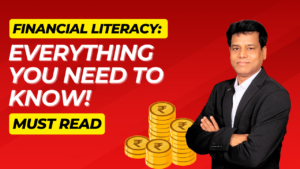Discover the essential components of financial literacy and gain the knowledge and confidence to make informed financial decisions. Learn budgeting, saving, investing, debt management, and retirement planning to secure your financial future.
In today’s complex financial landscape, possessing strong financial literacy skills is vital for making informed decisions and achieving financial well-being. Whether you’re a student, a young professional, or someone nearing retirement, understanding the fundamentals of financial literacy is key to taking control of your financial future. This comprehensive guide explores the core aspects of financial literacy and equips you with the knowledge you need to navigate the world of personal finance successfully.
1. What is Financial Literacy?
Financial literacy entails the ability to comprehend and effectively utilise various financial skills, including budgeting, saving, investing, and managing debt. It empowers individuals to make sound financial choices aligned with their goals and values.
2. The Importance of Financial Literacy:
Financial literacy plays a crucial role in several ways. Firstly, it enables individuals to establish a solid foundation by creating budgets, saving for emergencies, and planning for retirement. It also equips them with the skills to avoid common financial pitfalls like excessive debt and poor investment decisions. Moreover, financial literacy instils a sense of empowerment and independence, enabling individuals to take charge of their financial future.
3. Key Components of Financial Literacy:
a) Budgeting: Creating a budget forms the cornerstone of financial literacy. It involves tracking income, expenses, and setting financial goals. By establishing a budget, you can prioritise spending, save for future goals, and avoid overspending.
b) Saving and Investing: Financial literacy encompasses understanding the significance of saving money and making wise investment choices. This includes familiarising yourself with different savings options, such as savings accounts, certificates of deposit, and retirement accounts. Additionally, gaining knowledge about investment vehicles like stocks, bonds, and mutual funds can help grow your wealth over time.
c) Debt Management: Financial literacy involves knowing how to effectively manage and minimise debt. This includes understanding various types of debt, such as credit cards, loans, and mortgages, and employing strategies to repay them efficiently. Learning about interest rates, credit scores, and debt consolidation can contribute to achieving financial stability.
d) Risk Management and Insurance: Being financially literate means recognizing the importance of risk management and protecting yourself against unforeseen events. Familiarising yourself with insurance options, such as health insurance, life insurance, and property insurance, provides the necessary safeguards and peace of mind.
e) Retirement Planning: Financial literacy encompasses planning for retirement and comprehending the different retirement savings options available, such as 401(k) plans, IRAs, and pensions. It involves evaluating your future financial needs and taking steps to secure a comfortable retirement.
4. Resources for Enhancing Financial Literacy:
a) Books and Online Courses: Numerous books and online courses cover a wide range of financial topics, from basic budgeting to advanced investment strategies. Some noteworthy titles include “Rich Dad Poor Dad” by Robert Kiyosaki and “The Total Money Makeover” by Dave Ramsey.
b) Financial Workshops and Seminars: Many organisations and financial institutions conduct workshops and seminars on financial literacy. These events offer opportunities to learn from experts and gain practical knowledge about personal finance.
c) Online Tools and Mobile Apps: Various online tools and mobile apps are designed to help individuals manage their finances effectively. These tools assist in budgeting, tracking expenses, and monitoring investments.
d) Professional Financial Advice: If you feel overwhelmed or require personalised guidance, seeking advice from a certified financial planner can prove invaluable. They can provide tailored strategies based on your specific financial situation and goals.
Addressing Common Concerns: FAQs
Q: Is insurance necessary if I already have an emergency fund?
A: While an emergency fund is crucial, insurance provides a broader safety net for unexpected events, ensuring your financial stability isn’t compromised.
Q: Can insurance help with estate planning?
A: Absolutely. Life insurance can play a pivotal role in estate planning, facilitating the seamless transfer of assets to beneficiaries.
Q: Are there instances where insurance may not be necessary?
A: Dr. Samaddar suggests that insurance should align with individual circumstances. For instance, if you have ample savings to cover unforeseen expenses, insurance might play a lesser role.
Q: How can I determine the right insurance coverage?
A: Dr. Samaddar advises a comprehensive evaluation of your financial goals, responsibilities, and risk tolerance. Seeking professional guidance can help tailor coverage to your needs.
Q: Can insurance aid in tax planning?
A: Yes, certain insurance products offer tax advantages. For instance, contributions to retirement insurance plans can result in tax benefits.
Q: How does insurance contribute to a holistic financial plan?
A: Insurance complements a holistic financial strategy by providing protection against risks that can disrupt your financial goals. It ensures that unforeseen events don’t impede your progress.
Conclusion:
Financial literacy is a crucial skill that significantly impacts your life and financial well-being. By understanding the key components of financial literacy and utilising available resources, you can develop the knowledge and confidence to make informed financial decisions. Remember, financial literacy is an ongoing process, and continuous learning is essential to adapt to changing economic landscapes. Begin your financial literacy journey today and pave the way for a more secure and prosperous future.


